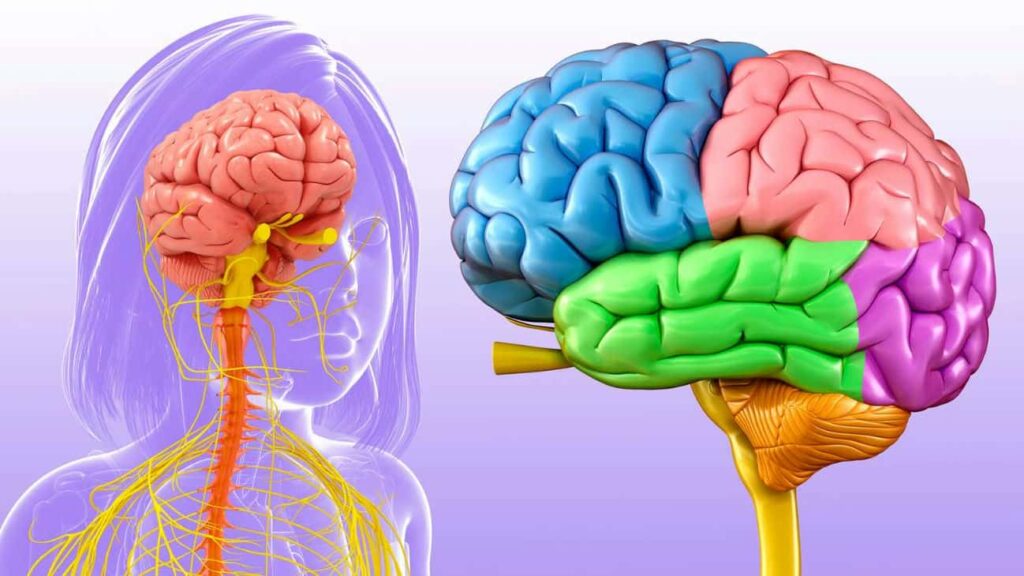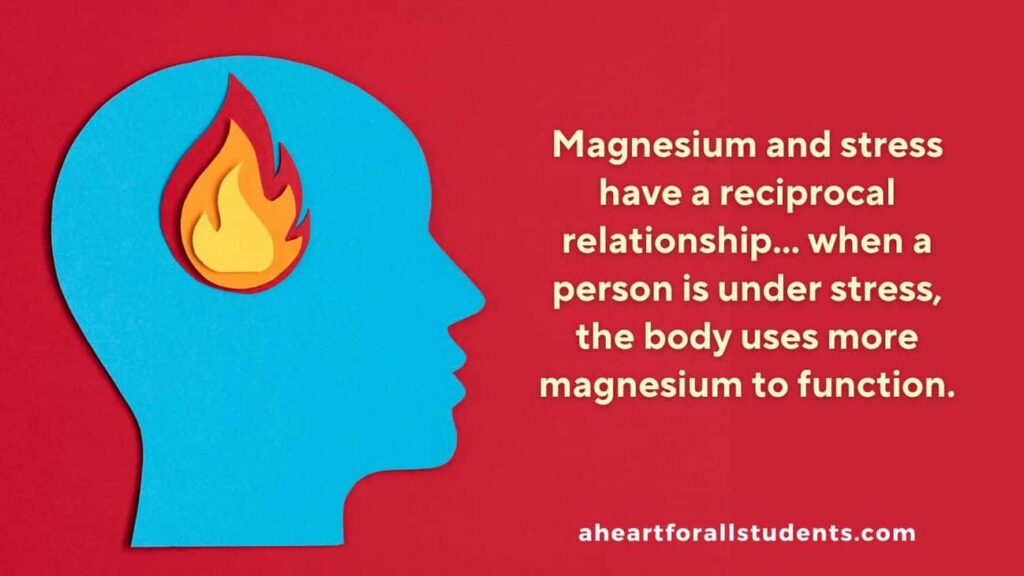How does magnesium help autism? Magnesium is an essential mineral responsible for more than 300 biological processes in the human body. Most Westerners are low in magnesium. However, autistic children and adults appear to have even lower levels of magnesium than the general population. Low magnesium in autistic individuals may contribute to distressing conditions often co-occurring with autism.
Today, we’ll dive into how using magnesium can support autistic wellness and lead to improvements in:
- Stress response,
- Autoimmunity,
- Attention, cognition, and learning,
- Mood,
- Sleep,
- Digestion
So, let’s answer the question, “How does magnesium help autism?”

This post may contain affiliate links. As an Amazon Associate, I may earn a nominal fee from qualifying purchases. Thank you for your support. See my disclosure policy for more info.
Seek Professional Medical Advice
This is NOT medical advice. I’m not a doctor, but an educator with a passion for researching, learning, health, and supporting the neurodivergent community. As such, this is for educational purposes only. I encourage you to learn as much as you can by learning, reading, and seeking the insight of multiple experts. Please discuss your healthcare decisions with a trusted healthcare provider.
What is Autism?
Autism is one of many unique neurotypes characterized by a different way of processing the world. Autistic and non-autistic people may differ in the following ways:
- Verbal social communication
- Non-verbal communication style
- Social interactions
- Non-autistic people prefer eye contact
- Autistic people may find eye contact distressing
- Play behavior
- Learning styles
- Sensory experiences
- Need for routines and structure
- Autistic children and adults often engage in repetitive behaviors (stimming)
- Distribution of attention
- Autistic people focus attention and energy on a few areas of intense interest
A Neuroaffirming Lens
To get an autism diagnosis, parents and adults need to work within the current medical model. Unfortunately, this means that autism is most often pathologized by doctors and labeled a disorder. Hence, the term Autism Spectrum Disorder.
Fortunately, the growing neurodiversity movement is changing the narrative for the next generation in the autistic community. This lens sees autism as one of many neurotypes rather than a disorder.
What is Magnesium?
As mentioned earlier, magnesium is a key factor in several bodily responses and systems related to enzyme activity. Unfortunately, two-thirds of people in Western countries are deficient in this essential mineral.
Lack of magnesium leads to high levels of free radicals in the body which, in turn, leads to oxidative stress. Diabetes and high blood pressure are highly related to this oxidative stress and are signs of magnesium deficiency.
While experts know that low magnesium levels lead to increased free radicals, they still don’t know the exact mechanism behind the relationship. Because of this, the research continues.
Sources of Magnesium

Dark leafy greens are an excellent food source of magnesium. Additionally, cod liver oil also provides magnesium and Omega-3 fatty acids that support healthy brain function. Additional food sources of magnesium include:
- Almonds
- Bananas
- Black beans
- Broccoli
- Avocado
- Brown rice
- Cashews
- Pumpkin seeds
- Sesame seeds
- Some whole grains
Supplemental Forms of Magnesium
There are more than ten common supplemental magnesium options including Magnesium.
- Sulfate
- Supports digestion and muscle relief
- Often used in the form of Epsom Salts
- Citrate
- Magnesium citrate is a powdered form used to help constipation.
- Oxide
- Magnesium oxide is commonly used for constipation.
- Malate
- Magnesium malate is an easily absorbed form promoted for overall health.
- Magnesium bisglycinate chelate
- Supports PMS, sleep, anxiety, bone health, and more.
Why Are We Low in Magnesium?
Researchers believe that there are a few variables involved in our chronic magnesium deficiency. The increased intake of processed food in the American diet is one contributing factor. Further, poor soil and farming practices are also to blame.
Additionally, certain medications decrease magnesium levels.
- Antibiotics
- Anti-seizure medications
- Corticosteroids such as Prednisone
- Proton-pump inhibitors
- Prilosec,
- Nexium,
- Prevacid
In the end, maintaining sufficient magnesium levels is critical to overall health, immune function, and healthy brain activity.
Magnesium’s Impact on the Nervous System

The consumption of magnesium plays an important role in the autonomic nervous system including:
- Heartbeat
- Blood pressure
- Breaking down insulin properly and managing blood glucose
- Communication between neurons (brain cells)
- Neuromuscular motor coordination
- tremors, tics
- Muscle weakness
- Dysphagia (difficulty swallowing)
Specifically, magnesium’s main action is energy production and protein synthesis. It supports the efficient communication of neurons (brain cells). Further, low magnesium levels are suspected to lead to brain cell death through a process called excitotoxicity.
Like all people, autistic children and adults need magnesium for optimal brain function. Learning, behavior, and emotional regulation depend on this essential mineral.
Symptoms of Magnesium Deficiency

Symptoms of being magnesium deficient include:
- Low mood,
- Including depression
- Migraines,
- Seizures and epilepsy,
- Anxiety,
- Digestive issues,
- Cognitive confusion,
- Chronic pain,
- fibromyalgia, rheumatoid arthritis
- Sleep problems
It’s important to note that this list is far from exhaustive. However, it gives us a place to work as we discuss the possible benefits of magnesium to the autistic community.

5 Ways Magnesium Can Improve Autistic Lives
Now we have an understanding of magnesium’s role in the brain and body, and of autism. So, now, let’s discuss the potential benefits of magnesium supplementation to support our autistic loved ones. We’ll focus on stress, ADHD symptoms, mood, sleep, and digestion.
1. Stress, Autism, and Magnesium
There’s no doubt that autistic children and adults experience an overwhelming amount of stress throughout their lives.
Living in a world designed in opposition to how you’re wired is enough to make anyone feel overwhelmed and stressed.
For example, for autistic children in a traditional school system, just getting through the day is a massive undertaking. One result of this is autism masking. Masking is when a child or adult learns to ignore their internal experience and needs to appease those around them.
Stress in Autistic Children
While every person masks to a certain degree at times, for autistic children, it’s a matter of survival. If they don’t mask their sensory overwhelm, emotional dysregulation, and stims, they suffer.
- Socially,
- Emotionally,
- Academically,
- or Worse
As such, it’s common for autistic and other neurodivergent children to return home from school and lose it. Researchers note higher levels of the stress hormone cortisol in autistic children compared to their neurotypical peers.
Magnesium, Stress, and Autoimmune
Additionally, magnesium and stress have a reciprocal relationship. As such, when a person is under stress, the body uses more magnesium to function. This leads to lower levels of magnesium stores, which then leads to increased susceptibility to the consequences of chronic stress.
That perpetuates the stress response, and the cycle continues. Chronic stress leads to multiple distressing symptoms.
- Irritability
- Nerves and anxiety
- Loss of energy
- Headaches
- Stomach and digestive issues
- Muscle stress
- Exhaustion
As we saw earlier, magnesium deficiency leads to many of these exact symptoms. Specifically, irritability and anger, stomach issues, and fatigue to name just a few.
The connection between stress and autoimmune conditions which is a common problem for autistic people is hard to deny.

How Does Magnesium Help Autism Stress?
What does the research say about adding magnesium to protect against high levels of stress? A recent study assessed the impact of Vitamin B6 in combination with magnesium in an adult population. After an 8-week protocol, researchers assessed:
- Stress levels,
- Anxiety,
- Perceived levels of physical activity
They saw significant improvements in all three areas. One small study assessed the impact of magnesium supplementation on pain levels in fibromyalgia patients.
The results were positive and support the belief that magnesium can be a major player in chronic pain relief.
Adding more food sources of magnesium to your child’s diet may be helpful to support your autistic child’s stress response. If your child experiences food refusal, magnesium supplements may be a good option to discuss with your child’s doctor.
2. ADHD Symptoms, Autism, and Magnesium
It’s well known that there is a strong relationship between autism and ADHD. It’s estimated that 50-70% of those with an Autism diagnosis will also have an ADHD diagnosis.
The challenges of ADHD, executive functioning difficulties, are a common problem for autistic children. For example:
- emotional regulation,
- attention,
- focus,
- planning,
- verbal working memory
Magnesium is believed to interact with dopamine and norepinephrine, the neurotransmitter systems compromised in the ADHD brain.
Executive Function and Magnesium Deficiency

This makes sense because magnesium deficiency occurs in ADHD at a higher rate than in non-ADHD children. Further, research shows magnesium supports learning, long-term memory, and the executive function skill of working memory.
Attention Deficit Hyperactivity Disorder (ADHD) is known within the medical community as one of the most common developmental disorders.
As a woman with ADHD living life in an awesome ADHD family, I see ADHD as part of the amazing neurodiversity of humanity.
Hair Magnesium Levels & ADHD Study
Fortunately, there’s quite a bit of research to back up the claim that magnesium can help with troublesome ADHD symptoms.
Researchers found a significant relationship between hair magnesium levels and ADHD symptoms.
- oppositional behavior,
- inattention,
- hyperactivity,
- and impulsivity
In this study, children with ADHD who had low hair magnesium levels were placed into two groups. Magnesium supplementation’s impact on their ADHD symptoms was then assessed.

How Does Magnesium Help Autism ADHD Symptoms?
The testing group was given magnesium supplements of 200 mg a day in conjunction with their usual medication. The control group, on the other hand, did not take any supplemental magnesium. After a few weeks of magnesium supplementation, researchers reported:
- highly significant improvement in
- hyperactivity
- and impulsivity
- significant improvement in
- inattention,
- and oppositional behavior
While the sample size was relatively small, this study as well as others points to the potential benefit of magnesium supplementation to improve ADHD symptoms.
More research into B6 with magnesium shows promise to reduce hyperactivity and aggression and improve social interaction.
New Measurement?
Researchers are beginning to shift from reliance on blood tests and blood plasma levels in measuring magnesium deficiency. Rather, they’re beginning to suspect that hair magnesium levels are a better measurement.
3. Mood, Autism, and Magnesium

The mental health data for the autistic community is tragic. As such, parents of autistic children must keep this in mind to protect their children.
A recent systematic review assessed the current literature on mood disorders and their relationship to magnesium.
Researchers looked at several well-controlled studies that had previously looked at this relationship to gather a more cohesive picture.
How Does Magnesium Help Autism, Depression, and Anxiety?
The researchers reported on clinical studies suggesting that magnesium may enhance the effectiveness of SSRI medication. Additionally, they found much research on the impact of magnesium on depression.
Further, in this review article, the authors approve of the current scientific literature stating that magnesium supports the regulation of mood-boosting neurotransmitters. These include serotonin, dopamine, and choline.
Further, a community-wide survey of adults showed an inverse relationship between the amount of dietary magnesium and depressive symptoms.
Important Note for Parents of Autistic Children
Parents of autistic children, if your child is taking antipsychotic medications. Due to known interactions between magnesium and antipsychotic medications, please use caution. Speak to your child’s doctor, developmental pediatrician, or psychiatrist when considering magnesium supplementation.
4. Sleep, Autism, and Magnesium
It’s well-known that autistic children often struggle with sleep. One research study found up to 53% of autistic preschoolers had some difficulties either falling asleep or maintaining sleep.
And as we all know, sleep deprivation is downright awful. Add this to the fact that children are growing at an exponential rate, and childhood sleep is critical to healthy development.
While research is limited on the effectiveness of magnesium on sleep, there’s evidence to support the use of magnesium to support healthy sleep.

Insomnia Support
In one 2019 study, adult patients with insomnia were given a supplement of magnesium, melatonin, and b vitamins.
- magnesium oxide (175 mg liposomal magnesium oxide)
- Vitamin B6 (10 mg)
- B12 (16 μg)
- melatonin (1 mg)
- Extrafolate-S, an alternative to folic acid (600 μg)
After three months of supplementation, patients saw a reduction in insomnia ratings. As such, the researchers recommend the use of vitamin B in combination with melatonin and magnesium as beneficial in sleep management in adult insomniac patients.
Parent-Recommended Magnesium for Sleep
Even without fully-funded research, many parents have found success with magnesium supplementation for their child’s sleep.
Many parents recommend having children soak in Epsom Salt baths before bed as a way to boost magnesium. Epsom salts dissolve in water releasing magnesium and sulfate ions.
Little research supports the claim that magnesium is absorbed through the skin. However, the calming effect may contribute to overall sleep hygiene. Ultimately, if your autistic child is struggling with sleep, it’s a good idea to discuss magnesium as a sleep tool with your pediatrician.
Magnesium and Circadian Rhythm
Another study suggests that magnesium may support sleep as it plays an important role in proper circadian rhythm support.
Another systematic review assessing the relationship between magnesium and sleep suggests that more research is needed. However, it’s important to remember that just because something hasn’t been measured, doesn’t mean it doesn’t work.
While not specific to autism, Dr. Andrew Huberman of Stanford’s Huberman Lab recommends Magnesium Threonate as a potential sleep supplement.
Dr. Huberman on Magnesium and Sleep
Dr. Andrew Huberman, Stanford University, discusses the role of magnesium threonate in sleep hygiene.
This is not specific to autism, but it does lend support to magnesium as a potential sleep tool.
5. Digestion, Autism, and Magnesium
It’s well known that autistic children often struggle with issues of the digestive tract such as:
- chronic constipation
- feeding issues
- diarrhea
- stomach pain
- gastroesophageal reflux disease (GERD)
- PICA (eating non-edible food items)
- Irritable bowel syndrome
Some researchers have connected the high levels of GI distress in autistic children with higher levels of the stress hormone cortisol (mentioned earlier).
Magnesium and GI Issues
While many autistic children are referred to as picky eaters, we should be cautious of our language. Many autistic children struggle with speech, and therefore, may have difficulty expressing discomfort related to food intake.
As noted, digestive distress is one of the most common troubles autistic children experience. So, it makes sense that pain, in combination with sensory issues, would lead to “food issues.”
Some doctors will recommend either magnesium citrate or magnesium oxide to help with constipation. Magnesium oxide and citrate can also lead to diarrhea, so it’s important to monitor your child closely.
Additionally, magnesium-rich foods and supplements can be helpful with certain types of irritable bowel syndrome.
Recap: How Does Magnesium Help Autism?
Magnesium is necessary to maintain healthy neurons and is crucial for healthy brain development and function. Further, there’s convincing support for magnesium’s role in helping with:
- Stress,
- ADHD Symptoms,
- Mood,
- Depression and Anxiety
- Sleep,
- Digestion
In the end, an easy way to support your autistic child is to help them get enough magnesium in their diet. If they struggle with food, talk to your child’s pediatrician about magnesium supplementation.
When discussing the treatment of autism, let’s not attempt to turn an autistic child into a non-autistic child. Rather, let’s help autistic kids with the support they need to thrive as themselves.
So, Friend. What do you think?
Up Next:
31 Sensory Toys for Autism and Why They Work (2024)
Motor Skills in Autism: Why Your Child’s Cerebellum Matters
17 Best ADHD Supplements to Improve Symptoms Naturally
Anger Management for Autistic Children (Not ABA)

About the Author:
Lindsay is a trauma-informed educator with a Master’s Degree in Teaching. Her mission is to support moms to equip neurodivergent kids (ADHD, Autism, Dyslexia, Anxiety) to thrive as exactly who they’ve been created to be. Wait until you hear the story that led to it all…
Seek Professional Medical Advice
This is NOT medical advice. I’m not a doctor, but an educator with a passion for researching, learning, health, and supporting the neurodivergent community. As such, this is for educational purposes only. I encourage you to learn as much as you can by learning, reading, and seeking the insight of multiple experts. Please discuss your healthcare decisions with a trusted healthcare provider.


Very good article. My son, age 37, has Aspergers. We are still trying to get help from te right type of therapy
He’s on fish oil -2000 mg whole food multivitamin, and a probiotic
I’m curious if you would recommend not only Mg threonate but other firms such as glycinate and citrate for anxiety and emotional lability
Have you considered adding Valerian root ?
Thank you
Diane English
Diane.english@rediscoveryhealth.com
Hi Diane, I’m not a doctor, but we take all three forms of Magnesium in our home. And as far as Valerian root, I’ve heard great things about it, but we haven’t added it to our daily regimen yet. I’ll definitely keep it on my radar. 🙂 Thank you!!